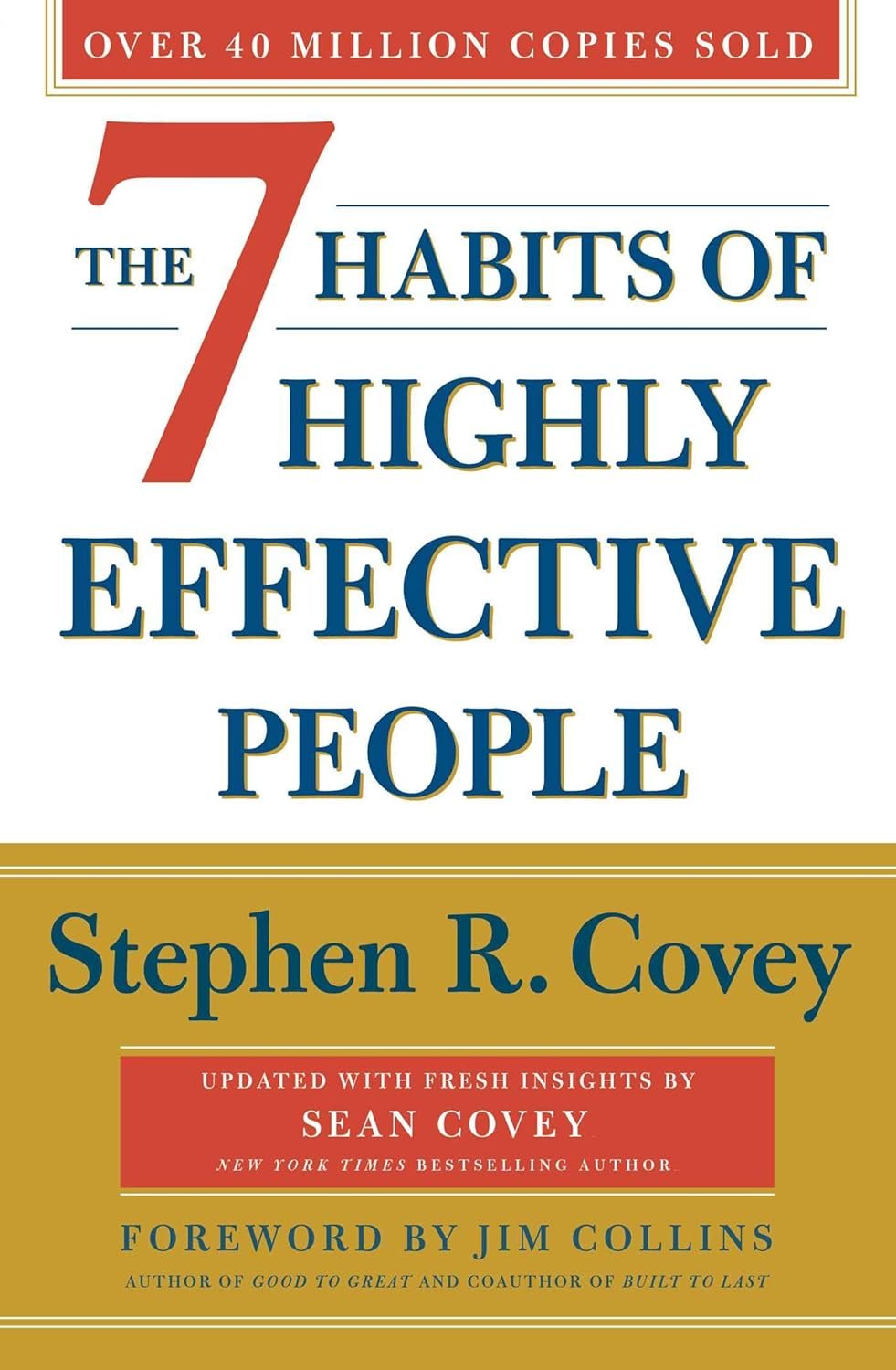Stephen Covey’s The 7 Habits of Highly Effective People is a timeless guide to personal and professional success. Published in 1989, the book introduces a principle-centered approach for solving personal and professional problems. Covey presents a holistic, integrated, and principle-centered framework that emphasizes character ethics over personality ethics, arguing that true success and effectiveness come from aligning with core principles and values.
Here’s a detailed summary of the seven habits:
1. Be Proactive
Core Idea:
Being proactive means taking responsibility for your life. Covey emphasizes that proactive people focus on things they can control (their Circle of Influence) rather than things they cannot control (their Circle of Concern).
Key Points:
- Responsibility: Covey introduces the concept of “response-ability,” the ability to choose your response to any given situation.
- Focus on What You Can Control: By focusing on your Circle of Influence, you expand it over time. Conversely, focusing on your Circle of Concern leads to a shrinking of your influence.
- Shift from Reactive to Proactive Language: Use language that emphasizes choice and responsibility, such as “I can” and “I will,” instead of “I can’t” or “I have to.”
Application:
Practice proactive behavior by identifying areas in your life where you can take initiative and make changes, rather than waiting for external forces to dictate your actions.
2. Begin with the End in Mind
Core Idea:
This habit is about setting clear goals and envisioning the future you want to create. Covey stresses the importance of personal leadership—knowing your values and principles and using them to guide your decisions.
Key Points:
- Vision and Purpose:
Define your personal mission statement, which serves as a blueprint for your life. This mission statement should be based on your principles and reflect what you truly want to achieve. - Personal Leadership:
Effective leadership starts with a clear understanding of your desired destination. It’s about making sure your actions are aligned with your ultimate goals and values. - Two Creations:
Covey explains that everything is created twice—first mentally, and then physically. Successful people visualize what they want to achieve before taking action.
Application:
Write a personal mission statement or life plan that outlines your goals and the principles you will follow to achieve them. Regularly review and refine this plan to stay aligned with your vision.
3. Put First Things First
Core Idea:
This habit is about time management and prioritization. Covey introduces the concept of personal management, emphasizing the importance of organizing and executing around priorities.
Key Points:
- The Time Management Matrix:
Covey categorizes tasks into four quadrants based on their urgency and importance:- Quadrant I: Urgent and important (crisis management)
- Quadrant II: Not urgent but important (relationship building, planning)
- Quadrant III: Urgent but not important (interruptions, meetings)
- Quadrant IV: Not urgent and not important (time wasters)
- Focus on Quadrant II:
Covey advises focusing on Quadrant II activities, as these are the tasks that contribute most to long-term success. - Delegation:
Learn to delegate tasks that don’t require your direct involvement, freeing up time for more important activities.
Application:
Identify your most important tasks and schedule time to focus on them. Avoid getting caught up in urgent but less important activities that don’t contribute to your long-term goals.
4. Think Win-Win
Core Idea:
This habit is about developing a mindset that seeks mutual benefit in all human interactions. Covey explains that a Win-Win mindset is based on the principle of abundance, where there is plenty for everyone.
Key Points:
- Abundance Mentality:
Instead of seeing life as a zero-sum game where one person’s gain is another person’s loss, embrace the belief that there is enough success to go around. - Character Traits for Win-Win:
Covey highlights three essential character traits for developing Win-Win relationships:- Integrity: Staying true to your values.
- Maturity: Balancing courage and consideration in your interactions.
- Abundance Mentality: Believing that everyone can succeed.
- Win-Win Agreements:
Create agreements that satisfy all parties involved, leading to stronger relationships and more effective collaboration.
Application:
Approach negotiations, collaborations, and relationships with a mindset of mutual benefit. Strive to create solutions where all parties feel valued and satisfied.
5. Seek First to Understand, Then to Be Understood
Core Idea:
Covey emphasizes the importance of empathetic communication. Before offering advice or solutions, take the time to truly understand the other person’s perspective.
Key Points:
- Empathic Listening:
Listen with the intent to understand, not just to reply. Empathic listening builds trust and opens the door to more meaningful and productive conversations. - Diagnose Before You Prescribe:
Covey uses the analogy of a doctor who prescribes medication without properly diagnosing the patient’s condition, highlighting the importance of understanding the issue before offering solutions. - Communicate Clearly:
Once you’ve understood the other person’s perspective, communicate your ideas clearly and confidently.
Application:
Practice active listening by fully focusing on the speaker and refraining from interrupting or offering advice until they’ve finished. Reflect back what you’ve heard to ensure understanding.
6. Synergize
Core Idea:
This habit is about creative cooperation. Synergy occurs when the whole is greater than the sum of its parts, leading to innovative solutions and better results.
Key Points:
- Value Differences:
Recognize and appreciate the differences in others, as these differences can lead to new perspectives and ideas. - Collaborative Problem-Solving:
When people with different strengths work together, they can create outcomes that wouldn’t have been possible individually. - Third Alternative:
Covey encourages seeking the “third alternative,” a solution that is better than what either party originally proposed.
Application:
Work collaboratively with others, valuing their contributions and perspectives. Seek to create synergy by combining strengths and generating creative solutions to challenges.
7. Sharpen the Saw
Core Idea:
The final habit is about self-renewal and continuous improvement. Covey uses the metaphor of “sharpening the saw” to emphasize the importance of taking care of yourself physically, mentally, emotionally, and spiritually.
Key Points:
- Four Dimensions of Renewal:
Covey identifies four areas that require regular renewal:- Physical: Exercise, nutrition, and rest.
- Mental: Reading, learning, and self-reflection.
- Emotional/Social: Building strong relationships and practicing emotional intelligence.
- Spiritual: Engaging in activities that inspire and uplift you, such as meditation, prayer, or connecting with nature.
- Balance and Consistency:
Regularly renewing these areas leads to a balanced and sustainable life.
Application:
Incorporate activities that renew your physical, mental, emotional, and spiritual well-being into your daily routine. Make time for self-care and continuous growth.
Conclusion: A Principle-Centered Life
Stephen Covey’s The 7 Habits of Highly Effective People is more than just a self-help book; it’s a timeless guide to personal and professional effectiveness. By integrating these seven habits into your daily life, you can achieve a balanced, principle-centered approach to success. Each habit builds upon the previous one, creating a powerful framework for living with purpose, building meaningful relationships, and continuously growing as an individual.
Whether you’re striving to improve your leadership skills, manage your time better, or simply live a more fulfilling life, this book provides practical, actionable advice that can help you make lasting changes. The principles Covey outlines are universal, applicable to all areas of life, and are as relevant today as when the book was first published.
If you’re serious about personal growth and achieving long-term success, The 7 Habits of Highly Effective People is a must-read. Its lessons will resonate with you long after you’ve finished the last page, guiding you toward a life of effectiveness, integrity, and deep fulfillment.
Final Thoughts:
- Integrate the Habits: The seven habits are interrelated and build upon one another. Practice them consistently to achieve long-term effectiveness.
- Character Ethics Over Personality Ethics: Covey emphasizes that true effectiveness comes from aligning with timeless principles and values, rather than focusing solely on external success.
Additional Resources:
- The 7 Habits of Highly Effective People Workbook: A practical companion to the book that provides exercises and activities to help you apply the habits in your life.
- The 7 Habits of Highly Effective Families: Covey’s follow-up book that applies the seven habits to family life and relationships.
Key Takeaways:
- Be Proactive: Take responsibility for your actions and focus on what you can control.
- Begin with the End in Mind: Define your goals and align your actions with your values.
- Put First Things First: Prioritize important tasks and manage your time effectively.
- Think Win-Win: Seek mutual benefit in all interactions.
- Seek First to Understand: Practice empathetic listening.
- Synergize: Collaborate creatively with others.
- Sharpen the Saw: Regularly renew your physical, mental, emotional, and spiritual well-being.








Comments